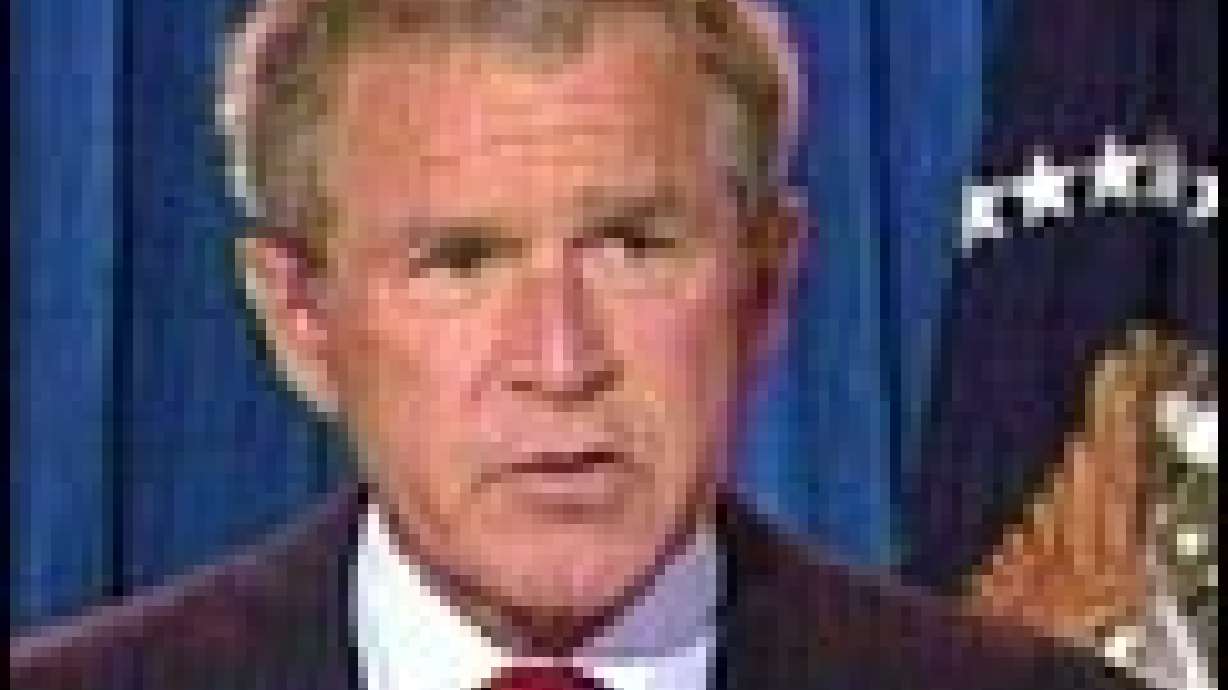Estimated read time: 4-5 minutes
This archived news story is available only for your personal, non-commercial use. Information in the story may be outdated or superseded by additional information. Reading or replaying the story in its archived form does not constitute a republication of the story.
WASHINGTON (AP) -- President Bush, rejecting criticism that he's lost control of his Iraq policy amid staff infighting, said Monday "the person who is in charge is me" and his strategy is producing solid results.
Bush, in a series of interviews, addressed accusations that his administration misjudged postwar Iraq, does not have an exit strategy and has let its strategy get bogged down in turf fights. The problem was underlined when a senior Republican, Sen. Richard Lugar, R-Ind., the chairman of the Senate Foreign Relations Committee, declared, "The president has to be president."
"If the people don't think I'm doing my job they'll find somebody" else, Bush said. "That's my attitude," he told Tribune Broadcasting. "Look, I just don't make decisions on polls and I can't worry about polls."
Bush in recent weeks has been dropping in the polls as voters express concern about Iraq and the uncertain economy. The president responded with a public relations offensive last week, complaining that progress in Iraq has not been adequately reported because of the "filter" of the news media.
He took aim at the media's Iraq coverage again on Monday.
"There's a sense that people in America aren't getting the truth," he told Hearst-Argyle Television. "I'm mindful of the filter through which some news travels, and sometimes you just have to go over the heads of the filter and speak directly to the people."
The president got a boost Monday in a new CNN-USA Today-Gallup poll that said his approval rating had improved to 56 percent from 50 percent in a similar poll in mid-September.
Bush sat down for a series of brief interviews with regional television outlets, trying to reach beyond Washington with his message.
Refusing to put a timetable on the U.S. military occupation of Iraq, Bush said, "The definition of when we get out is when there is a free and peaceful Iraq based upon a constitution and elections, and obviously we'd like that to happen as quickly as possible.
"But we are mindful of rushing the process which would create the conditions for failure," he said.
"If we were to get out right now it would be a terrible mistake," the president said to Tribune Broadcasting. "A free and peaceful Iraq is in this nation's interest, and plus we've made a commitment to the overwhelming number of Iraqis who do not want Saddam Hussein and-or his thugs to return."
Taking on his critics, Bush said, "They're just wrong about our strategy. We've had a strategy from the beginning. Jerry Bremer (the U.S. civilian administrator in Iraq) is running the strategy and we are making very good progress about the establishment of a free Iraq.
"And the person who is in charge is me," the president said.
Bush also rejected suggestions that he should have waited for more allies to join the United States before invading Iraq.
"I absolutely made the right decision at the right time," the president told the Belo television group.
Asked if Americans should feel deceived about his rationale for the war because no weapons of mass destruction have been found in the six months since major fighting ended, Bush told Tribune Broadcasting, "Let's get the words right. I said Saddam had weapons of mass destruction and he used them. Which he did. And second I said he was a gathering threat. And that's an important distinction. ..."
Bush's interviews came amid questions about who is in charge of his Iraq policy. Earlier this month, national security adviser Condoleezza Rice was named as head of an Iraq Stabilization Group to "cut through some of the bureaucracy and the red tape" and assert more control over policy. Defense Secretary Donald Rumsfeld grumbled later that he had not been aware of the move. There also have been well-publicized tensions among Rumsfeld, Secretary of State Colin Powell and Vice President Dick Cheney over Iraq.
On Sunday, Lugar urged Bush to take control of his quarrelsome foreign policy team.
"The president has to be president," Lugar said. "That means the president over the vice president, and over these secretaries" of state and defense.
Sen. Joseph Biden, D-Del., added: "There's no clear articulation within this administration of what the goals, what the message is, what the plan is. You have this significant division within the administration between the Powells and the Rumsfelds."
(Copyright 2003 by The Associated Press. All Rights Reserved.)








